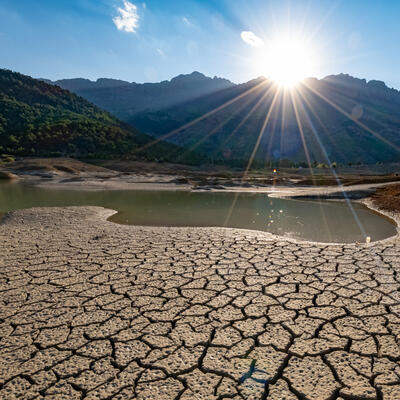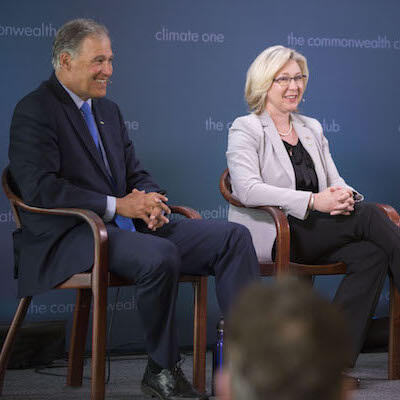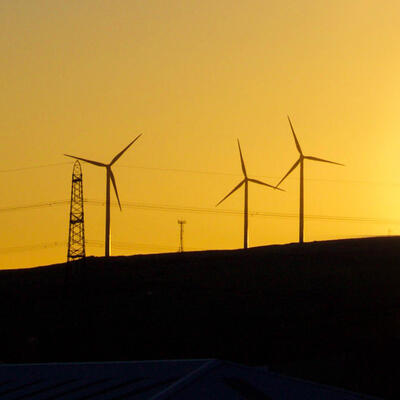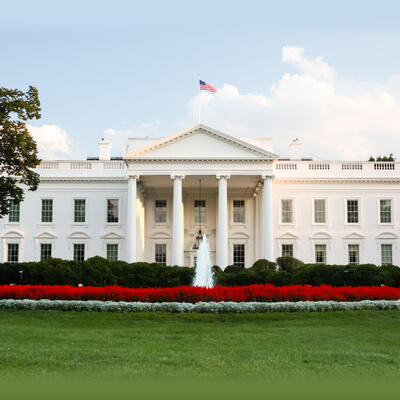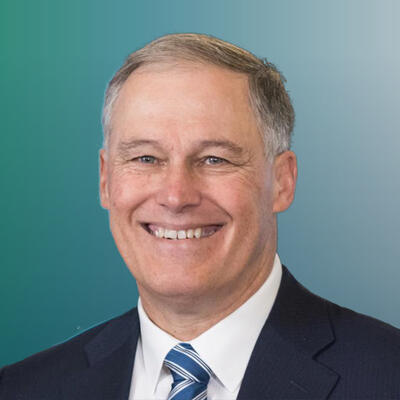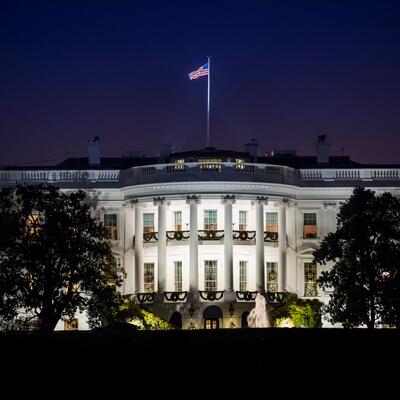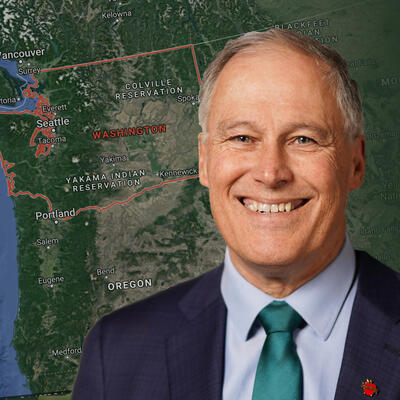
Jay Inslee, BP and Washington’s Climate Story
Guests
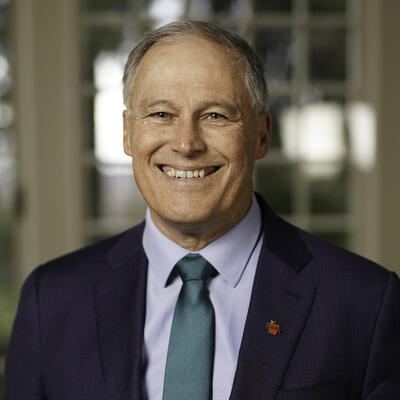
Jay Inslee
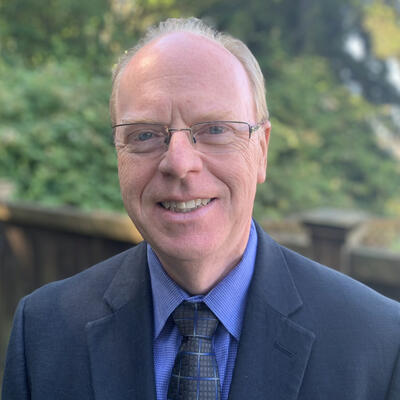
Tom Wolf
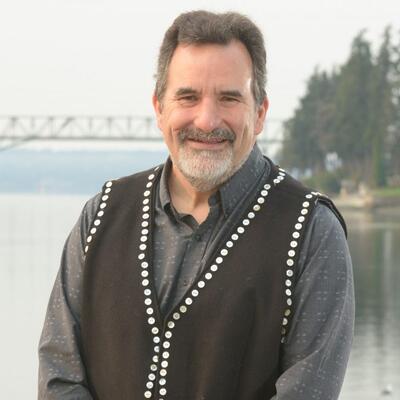
Leonard Forsman
Summary
Earlier this year, Washington state passed a bill to put a price on carbon pollution across a huge swath of its economy. But it didn’t get there easily.
In 2016, shortly after the Paris climate agreement was ratified, the state voted down a measure that would have imposed a carbon tax and reduced the state sales tax. In 2018, BP and other oil companies spent $30 million against a similar measure, which also failed. But this year, BP and several more former opponents of climate policy came on board, along with environmentalists and tribes.
Washington Gov. Jay Inslee says public consciousness about the climate emergency is changing quickly.
“People are now realizing the threat to their personal hopes and dreams; that’s the fundamental change. And the reason they're realizing that it is no longer an abstraction. In 1998 or 1999 when I invited Al Gore to come give his presentations to my colleagues, it was a graph. Now it's a picture of dead coral all around the world from warming and acidification,” Inslee says. “And that's why we have to be aggressive, assertive, take no prisoners and persevere.”
Inslee says Washington learned from California's experience passing a carbon cap measure in crafting its own bill. They’ve also focused on redressing past harms, with at least 35% of the revenue from the bill going to overburdened communities and 10% going to tribal projects and programs. The bill also expands air quality monitoring in those communities.
“We’ve crafted our environmental justice ways to make sure that minority and communities of poverty that are the first and the worst hit by climate change are benefited adequately by the dollars that are invested,” Inslee says.
Some tribes criticized Inslee’s line-item veto of language in the bill dealing with tribal consultation.
“Some tribal leaders are very upset by it, others like me were more philosophical about it,” says Leonard Forsman, chairman of the Suquamish Tribe. “We were a little frustrated by it but we've got other things that we're working on that the state and governor have been supportive of, so we feel like we can work with them to try to get some language that is acceptable and achieves the goals that we have for a meaningful tribal consultation.”
Inslee defended his veto, saying the original language was too expansive and he’s organizing a summit with tribes to work out new consultation language.
Support from tribes helped get the measure through the Washington legislature, as did support from BP, who opposed a similar measure in 2018.
Tom Wolf with BP says their change of position was partly due to the 2021 legislation making the carbon price economy-wide, as well as the company’s own internal decision to become a net zero company by 2050. He says BP knows the market and world are changing.
“And if you’re not adapting to the new market, the low carbon market that the Paris Accords are working toward, everyone's working toward, your business is not gonna be successful,” Wolf says. “We are transforming from an international oil and gas company to an integrated energy company. We’re doing that because it's good for business, it's good for investors, it's good for our board, it's good for our employees and it's also good for the environment.”
Gov. Inslee says he welcomes support from all quarters to get the necessary steps in place to address the climate emergency.
“An attitude of disrupting the status quo is a necessary survival mechanism for the human species right now,” he says. “Because the status quo is deadly it’s fatal it will destroy economies and the biology that we exist on."
Related Links:
EDF summary of the Climate Commitment Act
BP Net Zero by 2050
WA Dept of Ecology Summary
Full Transcript
Greg Dalton: This is Climate One. I’m Greg Dalton. This year, Washington became the second state to place a price on carbon across most of its economy. Governor Jay Inslee says there’s no time to waste:
Jay Inslee: We are waking up every morning figuring out how can I disrupt the status quo. Because the status quo is deadly, it’s fatal, it will destroy economies and the biology that we exist on.
Greg Dalton: The cap and invest bill made it through the legislature with surprise support from oil company BP:
Tom Wolf: If we do the same thing as today 40 years from now, just make oil and natural gas products and ship them around the world, our company is not going to be successful in 20 years, 30 years, 40 years.
Greg Dalton: So how do we balance protecting the economy and the environment as climate disruption continues?
Leonard Forsman: Clean water is good for the economy too. Healthy orcas and healthy salmon and robust tribal fisheries you know helps everybody out.
Greg Dalton: Washington’s Climate Story, Up next on Climate One.
Greg Dalton: Has Washington State set a new bar for robust and just climate policy? Climate One’s empowering conversations connect all aspects of the climate emergency. I’m Greg Dalton.
Greg Dalton: Washington has set in motion a price on carbon pollution across a huge swath of its economy. But it didn’t get there easily. In 2016, shortly after the Paris climate agreement was ratified, the state voted down a measure that would have imposed a carbon tax and reduced the state sales tax. In 2018, BP and other oil companies spent $30 million against a similar measure, which also failed.
NEWSBITE: Disappointment for climate activists as initiative 1631 is trailing this morning by about 13 percentage points…
But this year, BP and other former opponents of climate policy came on board, along with environmentalists and tribes. I asked Governor Jay Inslee why this coalition of previous foes came together to support Washington’s cap and invest bill.
Jay Inslee: Well, the world is changing and thank goodness. It’s not changing -- in one sense it’s changing too fast, which is the biological collapse of the systems we depend on as humans. It’s going way too fast that way but it was also changing the momentum we have to attack the first problem. And that is changing like weekly in the United States and it’s a good thing. Now, unfortunately, it has taken massive forest fires, billions of clams and mussels being cooked in their shells. Ocean acidification sea level rise, hurricanes, tornadoes, floods in Germany and China to bring the increased public consciousness. So, the public’s consciousness is changing on this dramatically in the last several years. And organs of government and business are responding to that including BP to some degree. So, the most fundamental change that has occurred is that people are now realizing the threat to their personal hopes and dreams. That's the fundamental change. And the reason they're realizing that it is no longer an abstraction, you know, in 1998 or 1999 when I invited Al Gore to come give his presentations to my colleagues, it was a graph, right, we had a graph. Now it's a picture of dead coral all around the world from warming and acidification. And so, people are experiencing this visually in their own lives, and that is fundamentally changing this and that's why we have to be aggressive, assertive, take no prisoners and persevere. And that’s what we have brought to the table as well. Now, we were able to craft through herculean effort support for this cap and investment bill. And that took a lot of shoe-leather a lot of listening a lot of consensus building to do something new that’s workable and tangible and answers the needs of so many different corners of society. One benefit we had as we learned from the California experience, right. So, we saw some of the imperfections of their first draft if you will, and we’ve learned from that to make sure that we have our cap that does create a meaningful price signal, the floor just didn’t dropout. We’ve crafted our environmental justice ways to make sure that minority and communities of poverty that are the first and the worst hit by climate change are benefited adequately by the dollars that are invested. Now, this also, I should note this is not our first success, right. So, the previous legislative session, we created the most ambitious and best clean electrical grid requirement for totally clean electricity. So, this wasn't our first rodeo, it's our most recent. With more rodeos to come; we’re still not done yet.
Greg Dalton: And you've vetoed sections of the cap and invest in low carbon fuel standards part of this package, sparking rebukes from two fellow Democrats. Assembly Speaker Laurie Jinkins and Senate Majority Leader Andy Billig. Both said your veto was overreach of executive powers that allow Washington governor to veto a full section of a bill not a subsection. So, what do you say to those who said that you exceeded your authority in pursuing this big climate win.
Jay Inslee: Well, I am a committed Democrat and I love those two leaders. But they are human and can make mistakes on occasion and will be forgiven in the fullness of time. Listen, we have to get these climate bills in place. This is a convoluted story. I don’t know if your listeners want to hear it. But basically, the problem was is that because of a couple of recalcitrant Democrats who are not those two leaders those two leaders have been good leaders to try to address climate change legislation. But in order to get this passed they had to put a poison pill in both of our climate bills that essentially kneecapped the bill. It basically said the bills were not going to affect until these other legislators got what they want which is a five cent in gas tax, well that’s crazy. What is a gas tax, what should a looming gas tax got to do with stopping climate change legislation? So, I rightfully within my constitutional prerogative and my moral obligation vetoed this with a total sense of confidence that it is in our constitutional power because it was a section veto because that section was unique. Now I won’t bother you with the arcane legalese of that but I’m in very firm ground that this veto is legally appropriate and absolutely necessary. We could not surround all legislators twiddle their thumbs worrying about a five-cent gas tax. That's nuts -- shellfish were dying and getting boiled on our beaches. The fires are consuming north-central Washington. I can't tell the folks in Washington well sorry we got to wait for a five-cent gas tax. That’s not the Washington way.
Greg Dalton: Many people the climate situation is so urgent that it requires bending rules, breaking norms, shaking up this status quo that rests on fossil fuel, capitalism, democracy is slow, by design. And there’s a growing group of people who think incremental change within the existing establishment is not going to get the job done.
Jay Inslee: Listen, an attitude of disrupting the status quo is a necessary survival mechanism for the human species right now. We are waking up every morning figuring out how can I disrupt the status quo. Because the status quo is deadly it’s fatal it will destroy economies and the biology that we exist on. So, that attitude is an appropriate one, but we can get this done while still maintaining our democratic traditions.
Greg Dalton: And you said earlier that BP has changed a little bit. I talk later in this episode with BP executive Tom Wolf. Do you welcome having oil companies on your side and now on this climate bill it strikes me as odd that oil is on board and Republicans aren't. That's an interesting picture.
Jay Inslee: As Lincoln said, as our case is new, we must think anew. And yes, we should welcome people who agree with particular strategies going forward and BP may disagree with other ones; that should not stop us from working to pass good policies in my book. The situation is too dire not to welcome any effort to try to pass good climate legislation. We don’t have the luxury of sort of dividing the world into two camps here.
Greg Dalton: Right. It’s what things used to do is cut deals with people you don't agree with --
Jay Inslee: The good old days.
Greg Dalton: Right, yeah.
Jay Inslee: It’s called democracy.
Greg Dalton: Tip O'Neill and Ronald Reagan. You also vetoed language and the bill dealing with tribal consultation and consent. Some tribal leaders have called this, “betrayal of tribal interest.” In this episode we’re also talking with Leonard Forsman, chairman of the Suquamish Tribe who says his people are frustrated with your veto but looking forward to working with you on new consultation language. How do you respond to the range of reactions from indigenous leaders about this big climate bill in Washington state?
Jay Inslee: Well, I was just in this field among the Colville Reservation and people welcomed the climate work we were doing with a lot of attaboys yesterday. They understand that we’re doing great climate work in Washington. I certainly didn't hear those frustrations yesterday but they do exist because there was the necessary veto because of the way this was drafted. And many of the tribes I've spoken to actually to understand the reason for the veto, which is, it would have given absolute authority under virtually any circumstance for any tribe to veto any project any clean energy project anywhere in the state of Washington for essentially any reason, without any justification including and here's why quite a number of tribes agree with the veto, not all of them, not all of them but many of them, is it would have allowed one tribe to veto a clean energy project on another tribe’s property. And the tribes are not happy, you know, the tribes are pretty proud of their sovereignty they don't want anyone violating their sovereignty. The way this unfortunately was drafted would allow one tribe to invade the sovereignty of another and stop their clean energy project. Well, we want tribes to be able to advance their own visions of clean energy and not to be intruded upon on their territory by another tribe. So, it had an imperfection. But the fundamental thing I'm sure Leonard will talk to you about, I’m a super admirer of Chairman Forsman, is that we have to have as good a consultation process as possible. So, when we develop these clean energy projects, we have to have close, persistent and effective consultation for tribes, if it's on land that they consider sacred or have a particular interest in and to have a process where in a sovereign to sovereign basis there's consultation about that, particularly early in the projects not just in the last day of the project. So, that we can, if there are ways to cite things in a way to achieve the goal of the clean energy project and avoid disturbing some ground called sacred. We ought to totally investigate those things; we ought to have robust conversations. So, next month or in September we’re gonna have a summit if you will with tribal leaders to work out that consultation language and I’m confident we will get there and people will feel good about this ongoing relationship.
Greg Dalton: Over this last year of racial reckoning in our country I've learned a lot about talk to indigenous leaders and then address my shameful ignorance of it. Frankly, the education I had about indigenous people in this country that been kind of erased and there's a growing realization in some climate circles that indigenous people have knowledge and practices that can help address the broader climate emergency. Prescribed burns of forests, for example, could head off the mega-fires ravaging the American West. What have you learned in your trips to these tribes from indigenous people that has personally resonated with you and shaped your thinking and behavior?
Jay Inslee: Well, we’re very blessed having these tribes in our state because they have a long view of history and the future, number one. And then the first thing that I think is such a virtue in my state is that we have tribes that when they think of these things think of the seventh generation when they make decisions almost in every decision they make. That is a huge virtue. It is an important survival tactic and it helps lead our state to make good environmental decisions. So, that's number one. To start every discussion thinking about it in those long-term views of what it does to our ecosystem. But the second and the more, you know, tactical way, you mentioned the burns. So, yesterday I was in this field and we we’re talking with the fire suppression crews there about how we do need to do some more prescribed burns to remove the dense fuel load on the forest floor, which is now so dry, which is going back to exactly what the tribes did here in the Nisqually Prairie 5 miles from where I’m sittingright now. They historically did burns that kept that in a system that was healthy for nutrition, berries game whatever they had and they managed the forest. And we’re gonna have to go back to some of that management style if you will. And fortunately, we have reached a good consensus in our state about how to do that. How to do that in a way that doesn't, you know, endanger more endangered species, that does not cause undue air pollution. We’re in a good place about how to do that work but we have to finance it cost money to do this work, right, it’s not self-supportive yet. We have increased our state commitment by millions of dollars to this work but you can imagine how many hundred thousands of acres that need this treatment over time; it’s enormous. And the scale of the fire danger is beyond imagination. We talked to these firefighters and they said, look, I’ve been doing this for 30 years, but I've never seen anything like this. These dry conditions are, you know, one ember is a catastrophic fire now.
Greg Dalton: Right. It’s astonishing. As a candidate for president in 2020 you shape the platforms of other Democratic candidates. You were the climate candidate and shaped the platform of Joe Biden and others. Progressives and climate hawks were disappointed when the recent bipartisan infrastructure deal did not include many of his plans for decarbonizing the US economy. Is President Biden being ambitious enough on climate?
Jay Inslee: Well, I will tell you I believe President Biden is doing a super job for us in this realm. And I'm a guy who debated him on climate and I think he has shown an enormous commitment to this issue. I think he gets it deeply. I think he has proposed, you know, 90% of the agenda that we need. I think he's going to be as tactical as possible to get as much of it as possible. So, I am not disappointed in his leadership on climate in this regard. But he has run into some legislative realities. One, being the filibuster and two be in a senator two in the Democratic caucus who are not yet totally expressing total commitment to these things. So yes, all of us could be disappointed this was not in the bipartisan infrastructure which is woefully short. Let me report this, the bipartisan thing is woefully short for what we got to get done. But the President recognizes that and that's why he is supportive of the reconciliation bill with billions of dollars appropriately invested in a slug of A-Z of clean energy strategies. And I think it's a very, very robust proposal in the reconciliation. Now he's got Nancy Pelosi in there who is one of the super leaders on climate and Schumer will help out too, I’m a House member so I would start with the House, Nancy. So, we have a lot of promise right now, but we need to get the reconciliation bill obviously to have what we need. And I’m hopeful that we can achieve that. Now, you know, I kind of disagree with the President on the filibuster on this though. I was the first candidate to say that when I was running and I’m still the firmest, it is such an impediment to survival of humans. The filibuster right now is one of the most dangerous things on the planet because it enables the fossil fuel industry to block progress of the things we have to do. So, I'm hopeful that over time everybody at least those who want to save the planet come to realize that and say that that's just an artifact of a bygone era. I'm also hoping that at the end of the day a couple of our Democratic Senators feel that they’ve run their string out far enough, now it's time to get on the bus, get on the electric bus, the sooner the better it has to this is our last chance and we have to get this done.
Greg Dalton: Well, if oil got on board with carbon pricing in Washington state. Is there any reason to believe they would get on board with national pricing that Washington is a sense a model for the country? That sounds very, I’m comfortable saying that because of history, but is that kind of, you know, too rosy to think that might actually come about?
Jay Inslee: It’s not too rosy at some point; it doesn't exist today. Again, this was not monolithic. We had one company, you know, BP that helped on this, but certainly the majority of the industry did not. So, you know I think the President has concluded that he doesn't have the political momentum to pass a universal cap right now. That's the thing that we had done that I hope will lead the nation that will ultimately be a national proposal. But it'll help if a state goes forward like Washington to show the way to show we’ll continue to grow our economy to continue to show we’re protecting our energy intensive industries because we do embrace some pricing system to build in, you know, a fee if you will of imports that we would have to compete with to show that this is doable. So, I think Washington is gonna help. I think eventually we will get there nationally. Maybe it's not today but it’s important in our states moving ahead to do that but we need much more than a cap system we need direct investment too. We need direct capital investment by the national government in a whole slug of things. Let me just mention infrastructure electrical charging infrastructure. We have some really great plans to move to electrical vehicles and I'm looking forward to the administration allowing the California zero emissions vehicle standard to go in place. The moment that happens my ZEV standard goes in the place as well. So, that's gonna be really exciting. But we have to build the electrical charging infrastructure as well and that is very helpful and direct federal investment in that; that's where the reconciliation package is so important. There is a portion of that in the infrastructure bill but it’s not enough because 40, 45% of our people don't, you know, they live in apartments they don’t have a place to charge their car. So, this requires investment, not just a cap bill if you will.
Greg Dalton: You’re listening to a Climate One conversation about Washington’s cap and invest bill. We’ll continue my conversation with Gov. Inslee later in the show. If you missed a previous episode, or want to hear more of Climate One’s empowering conversations, subscribe to our podcast wherever you get your pods. Coming up, a BP executive explains his company’s pivot to a new energy future:
Tom Wolf: The market’s changing. And if you’re not adapting to the new market, the low carbon market, that the Paris accords are working toward, that everyone's working towards, your business is not going to be successful.
Greg Dalton: That’s up next, when Climate One continues.
Greg Dalton: This is Climate One. I’m Greg Dalton, and we’re talking about Washington’s new cap and invest bill.
Greg Dalton: In 2018, Bill Gates and Michael Bloomberg helped raise a reported $15 million in support of a ballot initiative in Washington State that would've put a price on carbon pollution. BP alone spent a reported $13 million to defeat the measure. Tom Wolf is Senior Manager of Government Affairs for the US West Coast for BP America. I asked him why BP and other oil companies worked so hard to defeat that ballot initiative three years ago, and why BP changed course to back the carbon price measure that passed earlier this year.
Tom Wolf: So, in 2016 there was an initiative on the ballot that was an economy wide price on carbon that we were neutral on because it was economy wide and affected everybody equally. In 2018, as you mentioned, there was another initiative that really was just about us and it was just pointing at not us as a company, us as an industry and our customers. And it wasn’t economy wide and it let off the hook some other companies who have carbon emissions in the state of Washington. And we didn't think that was a fair approach. So, we did fight that measure. When we made that decision in 2018, we told the governor we told all the legislators that we would be in after this if the voters voted this down to try to find that sweet spot to try to find that price on carbon. And early 2019 we did just that working with legislative leaders and the governor's office saying how can we find that price on carbon that can pass. And I'm happy to tell you that we found that, and we were helpful in finding that price on carbon and that the solution in the 2021 legislative session and we’re pumped about it.
Greg Dalton: So, that was quite a switch, you know, there were a lot of people opposed the previous efforts, environmentalists were opposed, indigenous groups, environmental justice advocates. And this one seems to have brought along some surprising bedfellows some surprising supporters some interesting switches. So, you mentioned there that this because this was economy wide it affects everybody equally doesn't isolate one industry. What else was crucial to getting that coalition the third time, or perhaps more to get this through in Washington?
Tom Wolf: For one thing, the environment changed a bit for everybody. For us in 2020, we announced our aims and ambitions about being a net zero company by 2050 or sooner. And later on, the years we had specific benchmarks by 2030. So, we were a company that was talking about a lower carbon environment, talking about carbon pricing being important. And then in 2020 we became a company that every decision we make is through that lens, and that was a change. Other companies started making their net zero goals public and how they were going to reach that goal. Environmental justice groups and equity groups learned things from previous wins and losses. And we came together seeing what can we be for, what can we work together on. And the last piece of it is legislative and executive branch leadership. The governor's office, Governor Inslee’s office and the legislative leaders and the environment committees in the House and Senate and a decade of experience on this and a decade of losing on this but they learn from all those. So, when the endgame happens at the end of session when this bill is going to that last piece they knew the bill they knew the push points and they knew what they needed to get to through the coalition support to get the votes they needed to get the yes, and they pulled it off.
Greg Dalton: How important was just a rising evidence and experience of climate events, hot weather, melting snow, disruption as well as pressure from youth. How much did that change put pressure on all these groups to kind of get a deal this time?
Tom Wolf: Well, I think that's the biggest change. I think ultimately if you look back to when Gov. Gregoire first talked about climate pricing or carbon pricing. Imagine that 10 years ago and imagine how everything’s changed in the past 10 years, both in business, both in education, both in just common discussion about this issue. It’s been a seachange in 10 years. It might not be fast enough for some people, and I appreciate that. But that whole political environment has shifted. It still has more shifting to do; there’s more room to do it. But enough of that change where, you know, people's experiences, their conversations with their neighbors and their friends, what they see in the news - all of that matters and all of that has changed, especially over the last three years.
Greg Dalton: And you’re BP Senior Manager for Government Affairs on the West Coast of the US. How is BP's experience and the shift that you’re describing in Washington State will that ripple elsewhere across the country?
Tom Wolf: I hope it has a ripple effect, that's the whole point. The whole point is to get to a national price on carbon. And there’s no surprise that in the federal side there’s not a lot of activity. There's some discussion about it, but not a lot of activity on real solutions on this yet, on a price on carbon. And if we had to push it from the regional level to get the national attention and showcase what works, then let's do it that way. This isn't a victory by itself, this is a stepping stone.
Greg Dalton: And explain why BP wants a price on carbon.
Tom Wolf: We like a price on carbon because it drives innovation, it drives change for everybody, the individual and the company. And for us as we look at, let’s say the largest refinery in Washington State. We have 2.1 million metric tons of stationary source carbon emissions from our refinery. This is the largest single source emissions in the state after the coal plants in Washington State close mid this decade. We have a challenge ahead of us: how do we get to net zero by 2050 or sooner. And we do that, probably by making less, making it more efficiently, sequestering the carbon or offsetting the carbon. How do you get there? Well, you have innovation coming from inside the company and outside and you’re rewarded for the innovation. Under our cap and invest program now, if we lower our carbon emissions quickly or more quickly, we get benefit from that. So, it’s not just as such as the stick, there are carrots involved. And then you put that economy-wide; you think of people in garages and startups and boardrooms. What do I do? How do I get this new technology out? And that price on carbon drives that innovation and makes it more palatable in the market. I'm excited and really bullish on our ability to be innovative in this space and find those solutions.
Greg Dalton: But for more than a decade oil companies have been saying we want a price on carbon and there's been sort of frankly there’s been a double game. There's been public talking points and then there's what happens in the halls of power through the American Petroleum Institute privately where everything is done as possible to slow it down. So, why should we believe you now, because there’s been a lot of talk in greenwashing, etc. and I know some of this is other companies, Exxon, in particular, you know, we’re all for a carbon price and then things are done privately to slow that down. Why should we believe it now?
Tom Wolf: Well, ultimately, I think the cynicism is expected. I think the cynicism is necessary. I think we have to be; our feet have to be held to the fire. Talk is cheap. And I think the biggest proof point is it's about the environment but it’s also about the economic environment and where it's going and what we need to be a successful company in. If we do the same thing today 40 years from now, just make oil and natural gas products and ship them around the world, our company is not gonna be successful in 20 years, 30 years, 40 years, the market is changing. And if you’re not adapting to the new market, the low carbon market that the Paris Accord are working toward that everyone's working toward, your business is not gonna be successful. So, if you don't believe us in that we think we care about the environment, I understand that. Believe us that we want to be a successful business. We are transforming from an international oil and gas company to an integrated energy company. We’re doing that because it's good for business, it's good for investors, it's good for our board, it's good for our employees and it's also good for the environment. But if we don't do it if we don't make it then our business won’t be successful.
Greg Dalton: One way that the business is changing as global automakers are moving away from gasoline and investing billions of dollars in retooling their factories to make electric cars and there’s this kind of competition among countries and companies right now to say who's going to get off gas the fastest. So, what does that end of gasoline cars mean for an oil company like BP?
Tom Wolf: So, if this was BP in 1970, we be like, this would be a huge issue. But we’re adapting to the new marketplace. We’re the number one EV charging company in Great Britain right now. Pulse is the brand. And we’re looking at coming to the US. It's not a matter of if; it's a matter of how and when. And we’re trying to figure out that market where we get engaged and a lot of other companies are as well. It’ll be a very vibrant market. We’re gonna have to meet that challenge because those Toyotas and Hondas and Fords and GMs they’re all going to be making electric cars and consumers are gonna want them. I drive a Honda Clarity a plug-in hybrid and I'm learning how I use that car, you know, plug it at home, plug it in other places. And the industry will have to figure that out the market will figure that out. That is going to be a seachange much like probably how we went from horses to cars, right, and that seachange. But we’re gonna be part of that solution. So, we might make less gasoline. That doesn't mean necessarily we’re gonna be, you know, out of the game in terms of energizing mobility.
Greg Dalton: So, I asked the same question of auto company representative recently the Auto Alliance the big automakers in the country. And I said why should we believe you now because they were, in 2016 they were the first out after the election, saying, hey, let's ease off on these regulations for pollution standards. And he said, basically follow the money, you know, words are easy, but they’re investing billions of dollars into these new electric cars. It would be difficult to change if, say, a Republican president comes in ’24. I’d like to ask the same of you: follow the money, you know, CapEx, capital expenditures. What percentage of BP’s capital expenditures today are going to clean versus brown because ultimately words are one thing but you know billions of dollars in capital investment that shows a company's commitment.
Tom Wolf: Absolutely. So, before the 2020 announcement that we were going to net zero by 2050 or sooner. It was $500 million a year like 500 million with an M. A large amount of money, but I don't know what our CapEx but it wasn’t a large part of our CapEx.
Greg Dalton: Yeah, it’s like pocket coins in the couch for, you know.
Tom Wolf: Well, again, still a lot of money. I mean just to be clear. But since we did announce our new aims and ambitions, we have some specific benchmarks that we put out there. So, by 2030 that number will grow tenfold to $5 billion a year which is a 33% of our CapEx. So, to be clear to your listeners. We’re still going to be doing hydrocarbons we still believe we’re going to be doing hydrocarbons in 2030, some of them, and that we’ll need some capital expenditure to keep that moving; we’re gonna meet the market needs that the market were still gonna have for some of those hydrocarbons. But a third of our investments is gonna be in low carbon initiatives. And for a company like us that is a huge sea change. And I think the number by 2025 is $3 billion a year - and that's a floor, not a ceiling. And as I like to think that as the market changes and changes rapidly, that is a floor that will be doing more as more opportunities come up.
Greg Dalton: Tom Wolf is Senior Manager of Government Affairs for the US West Coast for BP America. Tom, since Pope Francis came to the United States in 2015 there's been rumblings about Republicans pivoting on climate. That has failed to materialize in a meaningful way aside from one energy innovation law championed by Lisa Murkowski and that was a significant piece of legislation. Last month, dozens of conservative legislators formed the new conservative climate caucus including Representative Cliff Bentz of Oregon and Dan Newhouse and Cathy McMorris Rodgers of Washington State where you are. Politicol reported recently that they then went silent as a devastating heat wave hit the Pacific Northwest. So, there's a new climate caucus and then it goes dark when there's a big climate event. You talk with Republicans privately, how do you see their public and private positions on energy and climate? And is this long rumored coming out ever going to happen?
Tom Wolf: I do talk to Republicans a lot. It is not difficult conversation. It’s a varied conversational and actually had that conversations with people of all political spectrums. There are people on the far left who think that oil refineries should shut down tomorrow. And I’m like what you use our products everyday. Again, there are some people on the right who are like, you guys should be doing what you do now you shouldn't change anything and that's not right either. But there is a growing group in the middle that is understanding that, the middle-right included, that is understanding where things are going. But I would argue to your listeners is you get the government that we deserve. It's the people who move politicians. I think the Republicans are talking more about climate change because their constituents are talking more about climate change. The constituents are going to give the Republicans an opportunity to get in this game and get in the way they haven't been before. That's how it happens. And on the left side, if I may say, it can’t be just pressures from people saying just shut down the fossil fuel industry or screw BP every chance you get. It gotta be how do we have these companies get greener, be part of the solution.
Greg Dalton: Right. But there's also an imbalance. I mean there’s a lot of fossil fuel funding that goes into Congress and there’s a few issues where, you know, frankly the votes are out of sync with public sentiment. The public wants background checks on guns; that doesn't happen, right. So, there are places where you know the politicians don't reflect public opinion. In Washington State, Republican state legislators oppose Washington's cap and trade bill that BP supported, you know, are there long-held political alliances that are shifting here?
Tom Wolf: I think in the state, there are. I think federally if I could solve the federal issue in Congress I’d be in a different podcast, Greg. But locally I just see those conversations changing. I do see the conversations with Republicans; they did not support the cap and invest program nor the low carbon fuel standard. That does not mean they don't see the problem, they're not sure of the solution. And I think over time this --
Greg Dalton: But what’s the opposition to the solution if an oil company saying, hey, this affects us we’re for it, when industry supports and environmentalists support it, indigenous people, icons of the Seattle Washington economy, Amazon and Microsoft support it and Republicans oppose it. I don't get it.
Tom Wolf: So, if I can channel them a little bit. The role of agriculture very iffy on this, you know, because they see pricing of fuel that they use all the time and they’re concerned about this. The constituents in the eastern part of Washington, which is much more conservative, they see those gas prices and they’re kind of focused on that. I just think over time, you know, I'm bullish, I’m a glass is half-full kind of guy, is that people will see this in a different light in the years ahead and will bring more Republican voices into this. But I’m not sure who is gonna lead whom. Will it be the people that says oh my God cut the crap we have to get this accomplished or will it be leaders telling their constituents, we have to get past this we had to go to this transition. But any time in our country transition is always been hard. It’s been a leap to get to where we have to get to but the people can get there. I think one of the reasons we got there as a company is because our employees and our investors and our market is telling us you gotta change. And I think that's one of the reasons we’re changing and that isn't any different for politicians.
Greg Dalton: Yeah, I think it's an interesting place where we are, where the global automakers and oil companies are out front moving more than the Republican Party because of investor and customer pressure. If Republicans don't come out and support the bills that BP wants them to support for something as important as climate change does that mean you change your political giving?
Tom Wolf: The short answer is yes. Yes, I'll be looking at that and I'll be making changes based on that.
Greg Dalton: What do you think of Pres. Biden's jobs and infrastructure plans. And is BP supporting, pushing that forward?
Tom Wolf: And we are, you know, we've been supportive of the Paris Accord obviously Pres. Biden put us back in the Paris Accord. President Biden is talking about net zero by mid-century; we’re talking about that. He’s talking about methane regulations we’re talking about methane regulations. There's a lot of synergies there. And, we’re not just focused on this in the US but globally working with governments to find that price on carbon or other regulations that incentivize the action toward a lower carbon society incentivize those actions to get to the Paris Accord goals. And for the infrastructure piece, whether it's mass transit or other pieces of it, anything that helps lower the carbon footprint that makes total sense to us. We’re looking at EV charging station incentives, we’re gonna be an EV charging world. We may or may not be successful in that world.
Greg Dalton: BP of course has been down this road before when it shifted from British Petroleum to Beyond Petroleum in 15 years or so ago under --
Tom Wolf: 20.
Greg Dalton: 20 years ago, under John Browne. During that time BP helped popularize the personal carbon footprint. You know, had a calculator on its website, and that makes some people think they’re like the oil companies trying to put the burden back on individuals. How do you think about the individual responsibility versus, kind of the systemic and industry responsibility for carbon footprints?
Tom Wolf: This is why I like the price on carbon so much; it puts the responsibility on everybody. And I'm hoping that through innovation the consumer has a smooth transition. The consumer goes from the flip phone to the smart phone and doesn't even realize that switch lowers carbon. But ultimately, we’re all responsible, we all have a place to do in this. As a company, we’re an international oil and gas company switching to an integrated energy company. We have a huge footprint and it’s our responsibility to find a way to get to net zero and lower by 2050 or sooner. But the consumer has to be looking for products and rewarding the manufacturers of those products that also have a lower carbon footprint. So, I'm not sure if it’s equal or greater or less than, but we all have to have skin in this game and I think through innovation we’re gonna find ways whether it's, you know, in our homes with electricity used by more efficient appliances, whatever that is. I think it'll be easier for consumers because the innovation will push it that way: consumers will buy good products that have a better carbon footprint. I think EVs are perfect example, Greg. Ultimately, I look at the issues we have both locally in Washington State and on the West Coast and nationally and our company and globally and saying how do we make sure we have a quality of life economic environment with a much lower carbon footprint. And it ain’t gonna be easy; if it was easy, we’d be doing it already we as a society. And I would argue that it can't be just individual companies and a couple consumers saying we’ll go to net zero by 2050. We need governments, national government setting that price and setting those expectations putting the carrots and sticks out. So, we all have that equal innovation to get to net zero by 2050 or sooner. It's gotta be a public-private work but without the public work, it ain’t gonna happen. We’re not gonna reach the Paris goals. That’s why BP is advocating globally for a price on carbon.
Greg Dalton: Tom Wolf, Senior Manager of Government Affairs, for the West Coast of America for BP America. Thanks for coming on Climate One.
Tom Wolf: It was my pleasure to be here. It's a great podcast and thanks for having this conversation.
Greg Dalton: The legislative success of Washington state’s new cap and invest bill also depended on support from tribes. Leonard Forsman is chairman of the Suquamish [SU-quamish] Tribe in Washington and also serves as president of the Affiliated Tribes of Northwest Indians. He spoke with Climate One’s Ariana Brocious about his view on the legislation that finally passed.
Leonard Forsman: I think it's a good first step towards addressing you know the impacts of climate change and carbon footprint management I guess you’d call it, reducing carbon footprint. So there was that and I think there's a lot of recognition of the tribal needs fiscally in there, in the set aside for tribal projects. And then of course there's concerns about the consultation issues and the fact that part of that was vetoed and of course there are concerns about that but we're trying to work through those best we can at this point in time.
Ariana Brocious: Am I right in thinking that you and some other tribes opposed previous versions of this kind of a bill in past years?
Leonard Forsman: Some tribes have had concerns about the aggressiveness of the bills regarding addressing the number of challenges in Indian country for one and then also in other communities of you know lower economic status or minority status. Trying to get those those issues redressed through a more what they make all more progressive approach. So there was a you know a lot of discussion about the fee or tax on emitters and then also the cap and trade. There's also the concern that's brought up is that we need to do something to reduce carbon emissions. There has to be a reduction and that sometimes the criticism of just taxing and creating revenue by taxing or putting fees on the emitters, on the polluters and then creating money that pays for resilience. And that's one of the reasons I supported like the initiative process was that we have a long list of projects that can help improve habitat that's been damaged here and so that helps us in resilience and cleaner water or less toxics, you know improving habitat functions that support salmon, clams, other wildlife so you know kind of weighing those against each other there's always been a challenge for me as a tribal leader.
Ariana Brocious: Yeah so just to make sure I kind of capture what you're saying or understand, so past efforts in the views of some tribes weren't aggressive enough in actually addressing the root causes, basically just like limiting carbon emissions and didn't do a good enough job addressing concerns of tribes in terms of restoration or these other projects that that need funding and need help?
Leonard Forsman: Right there's a number of you know there's relocation is one cost for some of the tribes on the coast, relocation not just the coast but other places they're from wildfires for example and also just addressing you know the fact that there's sea level rise and more storms and all those things so you just have those those types of projects and then there's also just the backlog of habitat restoration that needs to happen; it's becoming more important to do that because of the fact that we have to make our ecological systems more resilient. So not only were, they were damaged and need to be restored you now with the climate impact environments even more important so as far as the argument about carbon reduction everybody wants that right but some feel that generating income to take care of these other restorative projects is less important than actually getting at the carbon reduction issues.
Ariana Brocious: In this episode we're really exploring some of the questions of why this year this effort succeeded and what came together to make that happen and the support of tribes was part of that and I'm wondering in your mind how critical you think that was.
Leonard Forsman: Obviously the tribes have a lot of impact in Olympia because of our presence and also our you know we do contribute to a lot of political causes and we're very engaged with the state as we should be. And we were informed that this bill has some some good tribal provisions and we need to get it moved over to the house so some calls were made to some of the senators that we needed. And some of them you know were not fully behind it but our influence was able to we're able to get enough of a push to get it through and then over to the house and so then that's when they were really a lot of discussions were being had; the tribes have a presence but also within I think within this more within this session there was a lot of need for emphasis on restoring and repairing relationships based upon the racial history of the state and the federal government. So even more so I think it amplified our presence there in a little bit more than it maybe it has been in the past.
Ariana Brocious: Right, and speaking to that environment that you just mentioned, there have been statements from a couple of tribal leaders that the governor's line item veto of language related to consultation with tribes was in in one “a betrayal of tribal interests.” What's your position on that?
Leonard Forsman: Some tribal leaders are very upset by it, others like me were more philosophical about it. We've been supportive of Jay Inslee every time he's ran. We all know that we're not always going to agree. We were a little frustrated by it but we've got other things that we're working on with the state and governor have been supportive of so we feel like we can work with him to try to get some language that is acceptable and achieves the goals that we have for a meaningful tribal consultation.
Ariana Brocious: In general how do you rate Governor Insley's handling of concerns of indigenous people when it comes to these climate policies?
Leonard Forsman: One thing that I think has been a frustration for me is the balance between jobs, the economy, large corporations, polluters and tribal interests regarding protection of the environment. He's tried to balance that to a certain extent but oftentimes there's always this like conversation that happens. It's like well you know they employ a lot of people whether it's Boeing or another you know larger polluter or you know maybe a paper mill or whatever right. And the balance between those two things has always been a challenge for him and for us is trying to understand that you know we we have you know economic engines within our tribes and we try to balance that with our need to protect the environment and you know, the state needs to do the same thing. And I think that sometimes the pendulum or the weight always goes towards the jobs and protection of the economy over protection of our waters and our air and our ecosystems. so that's just that’s just containing it goes on and goes on every day and it's a challenge for all policymakers out there. So I just feel like clean water is good for the economy too, and healthy orcas and healthy salmon and robust tribal fisheries you know helps everybody out.
Greg Dalton: Leonard Forsman is chairman of the Suquamish [SU-quamish] Tribe in Washington.You're listening to a conversation about Washington’s new carbon cap measure. This is Climate One. Coming up, Washington Governor Jay Inslee on how he hopes his state’s policies will inspire others:
Jay Inslee: My state needs to do more and that's why we passed the best laws in the last two years and they're just starting to kick in, right. You don't solve the problem 12 hours after you pass the bill. I'm proud we have the best in the United States and I encourage everybody to catch us, right. Go ahead, try to catch us.
Greg Dalton: That’s up next, when Climate One continues.
Greg Dalton: This is Climate One. I’m Greg Dalton. Let’s return to my conversation with Washington Governor Jay Inslee. In a recent Climate One episode on public transportation we talked a lot about the push for parity of funding between cars and transit in infrastructure or other federal bills, as opposed to the 80 percent that now goes to cars and highways now. I asked Inslee if he supports that idea.
Jay Inslee: Well, I’m not sure I pick a numerical number of what constitutes parity, but I'll just give you some principles I think we should follow. Number one, you cannot build freeway lanes out of this problem. It's certainly endangered climate, and trying to pave, you know, a couple more tens of square miles is not a solution to my state's transportation woes. That is a physical reality. And when you think about parity, I guess we need parity each should use whatever mechanism we have to have good transportation options by eliminating carbon pollution, whichever works. The reality from a physical standpoint, is it every corridor of our transportation network has to carry more passengers per mile. And I'm confident over time that we will. Now, I don’t think that we should come to a zero roadbuilding. In our viewpoint in part, is we’re gonna be having electric cars which are fantastic. So, I do believe that historical split if you will change because the physical requirements and the new technology that’s coming on. I don't want to forget a whole bunch of new things, scooters. Scooters are not a toy, they are a transportation system right now, right. You combine light rail with a scooter and an electric skateboard and a bicycle you got a great system. And that’s happening in Washington state right now it's happening in real time.
Greg Dalton: On electric cars electrification mobility is great, they’re sexy their cost is coming down they’re going mainstream. I think the Ford F150 maybe a cultural game changer there, but there's a problem that people like me and you who drive electric cars. We don't pay gas tax to fund the roads. So, you dismissed earlier that kind of gas tax issue, but how are we gonna pay for roads with electric vehicles?
Jay Inslee: Well, first off, at the moment it is my belief that we should be incentivizing electric vehicles. We should be incentivizing the way for middle class and lower income people to afford electric vehicles. This is not the moment to dump charges on electric vehicles. They are still an emerging technology and I believe we should have incentives as we did in the solar industry, as we did in the wind industry. We should in the electric transportation system to incentivize rather than to punish people getting electric cars. So, at the moment I don't think that that's a route to go. But over time yes, we’ll have to figure out some way that everyone participates in our transportation revenue structure. It could be the vehicles per mile it could be somewhat, you know, a fee when you get your license. We don't know yet. There will over time need to be some system like that. But right now, when we’re trying to get this baby off the ground, I do believe we should be going the other direction, which is incentivizing this new technology making it easier for lower-income people to afford this technology. I think from an equity standpoint, that's very important.
Greg Dalton: Companies are setting goals of net zero emissions; that sounds good, but those pledges are often fuzzy and rely on offsets and other controversial tools. Many of them in your home state, Amazon, Microsoft and others. How much credence do you put in companies saying we’re going net zero? Should we really trust that?
Jay Inslee: Well, I think we should applaud any effort, even if it is not totally hundred percent angelic. I just think, yes, you can always make a criticism no matter what a person does and, you know, until Amazon delivers packages by mule you know you’re gonna have carbon emissions to some degree right now. So, I guess what I'm thinking is we should applaud efforts, and we should inspire further efforts, is the way I’m looking at it. So, and we should be reality based. If you make a pledge that means you know you're not using a particular product, but the sub product that goes into the product has enormous carbon footprint you got to pay attention to that, right. If you're driving an electric car but you’re using coal-fired electricity, you’re getting a small gain, but maybe not that much. So, yes, we have to be alert to all these things, but I applaud people who are, in part because it’s good for public sentiment to say that this is becoming an expectation of the community that everybody's gonna pull on the rope. But yes, everybody’s gonna need to be more ambitious over time.
Greg Dalton: I wanna re-circle back to something that we touched on. Washington's climate policies are modeled after California's which have been criticized for turning a blind eye to people of color that often live on fence line communities near refineries and other sources of local air pollution. What has Washington done to address those climate justice concerns. You mentioned that but I want to be sure we really nail that.
Jay Inslee: Yeah, we thought that was a fundamental pillar of our planet policies with equity. And so, we have been very intentional about this and built the strongest environmental justice provisions in the country. Just mentioned a couple of them. So, 40% of all the investment they would go through the cap and invest has to go to these communities of poverty where frequently and frequently BIPOC communities obviously where they’re getting the first and the worst of the pollution coming off these factories and our roads by the way, the roads are as dangerous as toxic pollution centers. I remember meeting a young woman, all her friends had asthma. She lives next to the freeway, right. So, for a fully 40% needs to be invested directly and we have a very equitable open decision-making system on how that is allocated. So, that's a significant improvement. 10% of all the dollars of the clean energy investment needs to go to tribal community lands. They represent less than 1% of the population. So, that was an important commitment as well. On the wage side we have the strongest incentive program to have people have good wages family wage jobs and through that union representation. So, in our previous bill we passed we have the strongest provisions that when you bid on a project to get a grant that will be awarded, you get extra points every time you do something to have more prevailing wages, to have safe standards to have representation. So, it’s a very strong incentive program. We want these new jobs to be family wage jobs. And frankly, this is a challenge for us because they're replacing older industries and newer industries kind of, you know, frequently start on the lower end of the economic curve. So, it is important for us to build into these policies a way to incentivize real family wage jobs as we go through this economic transition. I think if people look at our bill, they’ll be encouraged on a way to do that, that’s an important thing. Now, another important thing is to have the training, infrastructure to train people for these jobs as well. And it has to be not just in the urban core. I was in the other day in the tribal the Colville industry, that’s one of the things they were talking to us about. We need more training for wind turbine technicians and electric car technicians and the like. So, that's gonna be part of our effort.
Greg Dalton: Yeah, whole lot of new jobs being created there. We mentioned the climate summit in Glasgow coming up in November. You believe that states and regions could drive national governments to be more ambitious going into Glasgow - high-stakes there to move forward the Paris agreement. But a recent report from the Environmental Defense Fund analyzed carbon emission trajectories of states and found that Washington and many other states are not on track. So, how can states push countries if they’re not meeting their own goals?
Jay Inslee: Well first off, we can push ourselves and we can push each other. In my state, we actually are doing well on a per capita per dollar GDP. We are doing relatively well compared to other states. But you’re always a victim of your own success. My states’ been named the best place to live two years in a row. No governor in American history can claim that, where their state’s been named the best place to live for two years in a row and obviously part of that is our best economy. When that happens, people move into your state, and they are economically active, and when that happens, your carbon emissions are associated. So, we’re attracting people from all over the world and they're coming here. So, on a gross basis we have not been able to drive down as fast as we would like, but we are in a per-unit GDP and per capita. We’ve been considerably successful. But what I would say to everybody: my state needs to do more and that's why we passed the best laws in the last two years and they're just starting to kick in, right. You don't solve the problem 12 hours after you pass the bill. So, these bills need to take effect for us to achieve our goals. I'm proud we have the best in the United States and I encourage everybody to catch us, right. Go ahead, try to catch us and that's a good challenge to be in. By the way Glasgow what we’re doing besides just pushing our national governments. We want to have coalitions and agreements between ourselves that we will commit to ourselves county to county state to state to commit ourselves to higher ambitions. They may be more aggressive in our nation states and that's appropriate because Washington state can do something, I can do something that Pres. Biden can't do, you know, I'm not negotiating with senators from West Virginia. So, I can move my state faster than he can move the nation. And so, we have to make our states laboratories of democracy and clean energy. We need to be ahead of our nation states on these policies as we intend to do in Glasgow.
Greg Dalton: On this Climate One... We’ve been talking with Governor Jay Inslee, Tom Wolf of BP and Leonard Forsman of the Suquamish Tribe about Washington’s new cap and invest bill.
Greg Dalton: To hear more Climate One conversations, subscribe to our podcast on Apple, Spotify or wherever you get your pods. Talking about climate can be difficult and sometimes depressing, but solutions begin with discussions like these. Please help us get people talking more about climate by giving us a rating or review. It really does help advance the climate conversation.
Greg Dalton: Brad Marshland is our senior producer; Ariana Brocious is our producer and audio editor. Our audio engineer is Arnav Gupta. Our team also includes Steve Fox, Kelli Pennington, and Tyler Reed. Gloria Duffy is CEO of The Commonwealth Club of California, the nonprofit and nonpartisan forum where our program originates. I’m Greg Dalton.
